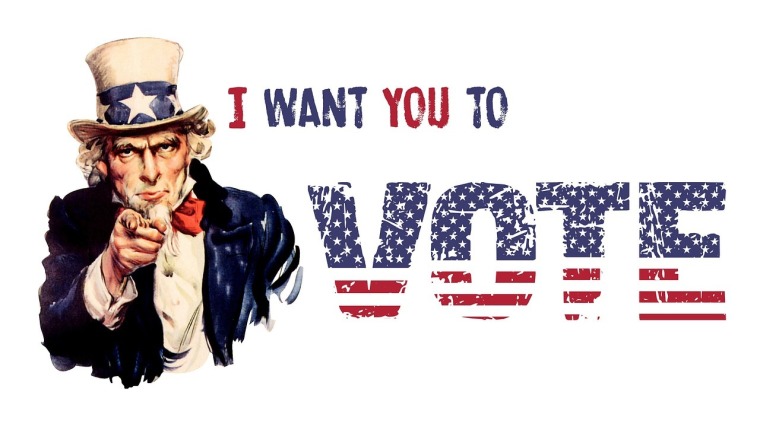
The USA has long fascinated me, and I have embarked on a series of reflections on culture in the USA, using American film or television as a prompt. This is the tenth article and considers voting, particularly for the Presidential elections.
How can one not think about voting when you consider the somewhat ubiquitous system of voting. In the USA, voting is conducted for many offices, and from an outsider perspective it appears one could spend the whole year voting or at least being targeted to vote. Even the iconic Uncle Sam recruiting poster has been utilised to encourage people to vote.
Unlike Australia, where technically one has to at least turn up and have your name crossed off the electoral roll, even if you don’t mark the paper (s) at all, voting in the USA is symbolic with freedom. You don’t even have to turn up to drop in an informal ballot. This is a marked distinction because it means one has to have a level of motivation.
In the USA there are also the usually hard-fought primary elections where only registered members of the main parties vote to choose the candidate (s) for their particular party. These primary elections can now be as vicious and confrontational as the general elections, and could be seen to be contributing to the wider development of electoral cynicism, particularly when winning and defeated candidates move to say good things about the person they had previously depicted as the devil incarnate.
Interestingly, while people may be registered with a certain party that does not mean they have to vote for that party when undertaking their ballot at the (final) general election.
Does a party reflect the membership today?
A common misunderstanding today is that it is assumed voters support a party or person because of their overall policies or philosophy. Ignorance abounds in terms of knowledge of policies and philosophy, with people more likely to make the party confirm to their own image at least in their mind.
While there has certainly been increasing polarisation between Democrats and Republican, there has also been fluidity in affiliation, often related to an issue or concern, and particularly when economic circumstances change significantly.
There has also been an entrenching of a more dogmatic form of economic politics, connected to beliefs about freedom, individualism, and social justice, and this has led to more defined left and right economic ideology.
Christians and Voting
In the last two Presidential elections (2016 and 2020) it became evident that there was increased polarisation within the Christian and church communities. The fundamental dilemma for many Christians was the simple issue of actually voting: ‘If I am going to exercise my right and actually cast a vote, who will I vote for when the candidates are flawed, and sinful people, and the parties don’t have perfect policies in all areas that I deem to be important.’
It was an easier decision to simply not vote, but if one believed it was a duty and responsibility to vote, who and/or what would you vote for? It seems that more people today are so focussed on one area or issue, they are prepared to give a ‘pass’ to other issues and areas, including the public or private behaviour of candidates if they deem that their main focus isa critical matter.
Conservative and traditional Christians have increasingly become focussed on a few key areas including the following:
Abortion
This could be the number one issue for a single focussed Christian voter now, and because of the increasingly polarised position of the parties it has become clearer for most Christians which party represents a prolife position.
Judicial Appointments
There is no doubt that people vote for some Presidential candidates because they see that candidate as their best opportunity to secure more Supreme Court appointments that will support their prime focus, and that is related to the point above.
A reaction to the agenda of the left
From my reading of the USA divide, party divide has increased mainly because the Democrats have moved further and further to the left of politics in areas of traditional morality and family. Republicans have usually been traditionally conservative and to the centre or centre right, but many ordinary Americans would not have had the orientation to go further to the right without the left moving further and further left.
Some of the conservative reaction has been personal concern; parents who desire more say in the education of their children; people who don’t like more liberal social and moral policies and seeming infringements on their own liberty to undertake their business affairs and contracts as they would like.
For others it is out of concern for the agenda of the left and its wider impact on society and a desire to alertmembers of society who are not aware of the significant changes so that they become more aware.
These comments and thoughts can be read in conjunction with those on the USA and politics. I could simply outline again the reflections that I included there on aspects of The West Wing and The Ides of March(a fascinating and unpredictable party-based film), but below are three films that highlight different elements of the American voting system.
Election (1999)
While a high school context, this now semi-cult film encapsulates the issues of voting. It provides a microcosm of all the bad aspects that can come with elections. In Australia student politics is usually at university level, while in the USA high school student government is the training ground for adult politics. Reese Witherspoon has a star turn as the main candidate and Matthew Broderick plays her nemesis attempting to thwart her ambitions.
Selma (2014)
There are a number of documentaries about voting rights, but this dramatic film helps to capture the time and the issues of 1965 related to the Selma to Montgomery marches for voting registration rights.
Game Change (2012)
A film that polarises according to one’s political persuasion but provides aneye-opening look into the dynamics of a Presidential race (2008) and the key issue of choosing a running mate. John McCain’s choice of Alaskan Governor Sarah Palinas his Vice-Presidentrunning mate was meant to be a game-changer and it certainly highlighted the diverse voting patterns in the USA.
Julianne Moore played the role in a straight and reasonably sympathetic way and Ed Harris as John McCain played a solid, almost supporting role, perhaps mirroring in an ironic way some of the eventual real-life dynamics.

Peter Bentley is a Sydney (Australia) based writer and commentator on church, media and cultural issues. He is a former President of the Australasian Religious Press Association.